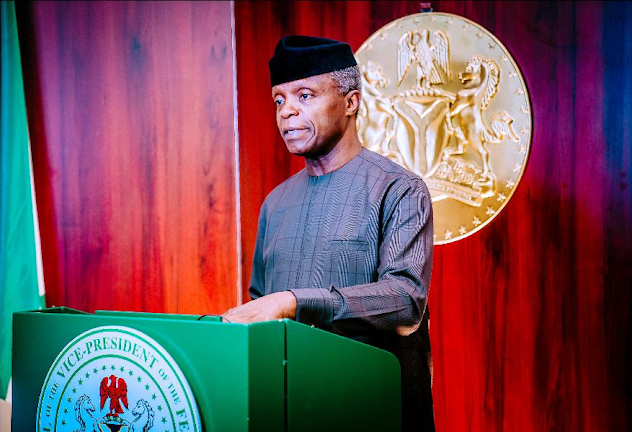Empowering women is existential for Nigeria, Africa – OSINBAJO
(Nigeria) Vice President Yemi Osinbajo, SAN, believes that
“ensuring the education of women and empowering them is an existential issue
for Nigeria and the rest of Africa”, otherwise holding women down means holding
their societies down.
Prof. Osinbajo stated this Monday in a keynote address at a
webinar organized by Women In Africa, WIA, in collaboration with the MacArthur
Foundation, to mark the 2021 International Women’s Day.
Anchoring his contributions on the theme of the 2021
celebrations “Choose to challenge”, the Vice President noted that “a child of a
mother who can read is 50 percent more likely to live past the age of five.
Each additional school year increases a woman earning by 20 percent, 2/3 less
maternal deaths if mothers finish primary school.”
“If we hold down half of the productive segment of our
nation on account of culture or other frankly outdated considerations, we are
much poorer and much more deprived as a whole. We do ourselves a favour by
ensuring social and legal equality of women,” he added.
Speaking on correcting stereotypes against women in Africa
and other developing societies, the Vice President said “for many generations,
women have fought these manifestations of gender inequality. Over time the
struggle has been refined to the level of a right to gender equality.”
Explaining further, he said that “the notion that women and
men should have the same legal, social and political rights is the public law
basis for Feminism. But something has changed in the past few years.”
Highlighting the
gains of improving women participation in governance and other aspects of
society, the Vice President said “women are now saying that the fight for
gender equality is not for women and girls alone, it is also a fight for all
fair minded and just men who believe that men and women must have equal
rights.”
Describing the reinvigorated campaign for gender equality as
the greatest leap of development in contemporary history, Osinbajo said “the
campaign is much more important in shaping the future. Men are now being
challenged to stand shoulder to shoulder with women in the struggle for gender
equality.”
His words: “They are learning that insisting on equal rights
for women is an imperative of justice and fairness, an entitlement, a debt owed
to women and girls not a gift.
The Vice President who advocated for a change not just in
laws but in mindsets and conventions, added that this is the basis of the
theme, calling everyone to ‘Choose To Challenge’ biases and misconceptions in
favour of a more gender inclusive world.
“But I would like to suggest that the most effective
challenge that can be mounted is the education of girls,” Osinbajo submitted.
“There is no question that this is the single most potent
game changer in this story. Not only does it provide options for economic
empowerment for women, but it also ensures that their own children will be
educated, that they will not be married off too early with the attendant health
and population implications.”
The Vice President then added that the idea of empowering
and ensuring the education of women is receiving support at the highest level
of governance in Nigeria, citing a strong call from Mr. President to governors
in 2019 as a worthy example.
Osinbajo said: “the President underscored this point while
speaking to governors at the (second term) inauguration of the NEC on the June
20, 2019, when he reminded them that they have the responsibility for primary
and secondary education and for ensuring that primary education Is free and
compulsory. Citing the relevant laws he said Section 2 of the Compulsory, Free
Universal Basic Education Act provides that every Government in Nigeria shall
provide free, compulsory and universal basic education for every child of
primary and junior secondary school age.”
He added that the Buhari administration has in most of its
programmes given priority to women and other vulnerable groups in the society.
Reeling out specific programmes that had women at the fore,
he said the Social Investment Programme focused deliberately on giving women a
more equal opportunities. 56 percent of beneficiaries of the Government
Empowerment and Enterprise Programme or 1.5 million women have been empowered
by the TraderMoni and MarketMoni micro credit schemes.
“Of the 500,000 beneficiaries of the Npower graduate
employment scheme, over 45 percent of benfeciaries are female. For the Conditional Cash Transfers 96 percen
of beneficiaries are women.
“This programme in particular has demonstrated the
resilience and focus of the women who have been receiving the N5,000 monthly
stipend. How they have continued to invest in their' communities and grow their
money. As at December 2020, they had
formed almost 35,000 savings groups in 27 States,” according to the Vice
President.
Other speakers at the event include President of the MacArthur Foundation, Mr John Palfrey; CEO of AXA Africa, Hassan El-Shabrawishi; President of Women In Africa Initiative, Hafsat Abiola-Costello, who moderated the discussion, among others.




Comments
Post a Comment